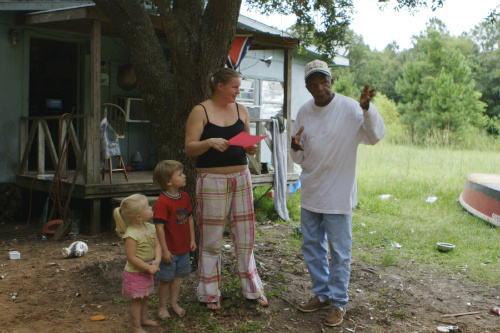SXSW Review: The Great Invisible

April 20, 2014 will be the fourth anniversary of the explosion of the Deepwater Horizon oil rig, which caused a spill of an estimated 176 million gallons of oil into the Gulf of Mexico. This horrific incident seriously altered the lives of the men who worked on the rig -- and the families of the 11 who lost their lives -- as well as the communities who once survived off jobs based on healthy waters in the Gulf. In The Great Invisible, director Margaret Brown (The Order of Myths, Be Here to Love Me) explores the aftereffects of the explosion and oil spill from multiple viewpoints.
Doug Brown, the chief mechanic for Transocean on the Deepwater Horizon (owned by Transocean, but leased by BP), gave the director some video he filmed on the rig before the disastrous night. He and another victim of the explosion, along with their wives, talk about their experience that night and their current fragile existence.
Keith Jones, father of one of the men killed in the explosion, comments on America's "insatiable thirst for gasoline" and follows the BP/Halliburton/Transocean trial to New Orleans. Brown gives these interviews intimacy, while framing them against the larger issues of America's dependence on oil and our government's participation through oil leases.
Director Brown also takes the viewer to Bayou La Batre, Alabama, once a seafood stronghold. We're introduced to Roosevelt Harris, a volunteer (pictured in the above still) who delivers goods from his church's food pantry to people in his town who can no longer make their living off the Gulf. Since I found Roosevelt so fascinating, I asked the director after the screening, via email, how she met up with him. Here's what she said:
We were looking for churches in Bayou La Batre, as often people mobilize around them. We had heard that there was a woman everyone called "Miss Daphne" who ran a food pantry out of a church. We called her and she said to come on down. When we got there, Daphne suggested that we ride around with Roosevelt, who delivers food to folks who were homebound. When we got in his truck, he just started talking. In fact, the first shot of him driving was pretty much the first thing he ever said to us.
Roosevelt is the kind of man who cooks and serves free weekly spaghetti dinners for his neighbors, and says, "If you can't give a blessing, you're a mighty poor man." This statement is a harsh contrast with the greed of the oil companies, somewhat personified through oilmen filmed talking around tables and smoking cigars (Note: BP declined to be involved in the documentary; these men are from lesser-known companies). With trickier editing, they could have come off more of a "corporate fat cat" stereotype, but in The Great Invisible they appear as human as the rest of us, especially when a couple of them say something that seems almost sensible.
The Great Invisible is a character-driven documentary, filmed in three-and-a-half years, that strives to remind us of the harsh reality: If we continue relying on "cheap" gasoline, something like this could very well happen again. Brown's film is eloquent without being preachy, with many moments that are impactful and heartbreaking at the same time.
Read my short Q&A with Margaret Brown here. The Great Invisible screens again Wednesday, March 12 at 11 am at the Paramount Theatre.
Austin/Texas connections: Margaret Brown used to call Austin home. Local cinematographer/filmmaker PJ Raval shot some footage. David Wingo (Prince Avalanche, Mud) scored the film. Louis Black is one of the producers.

